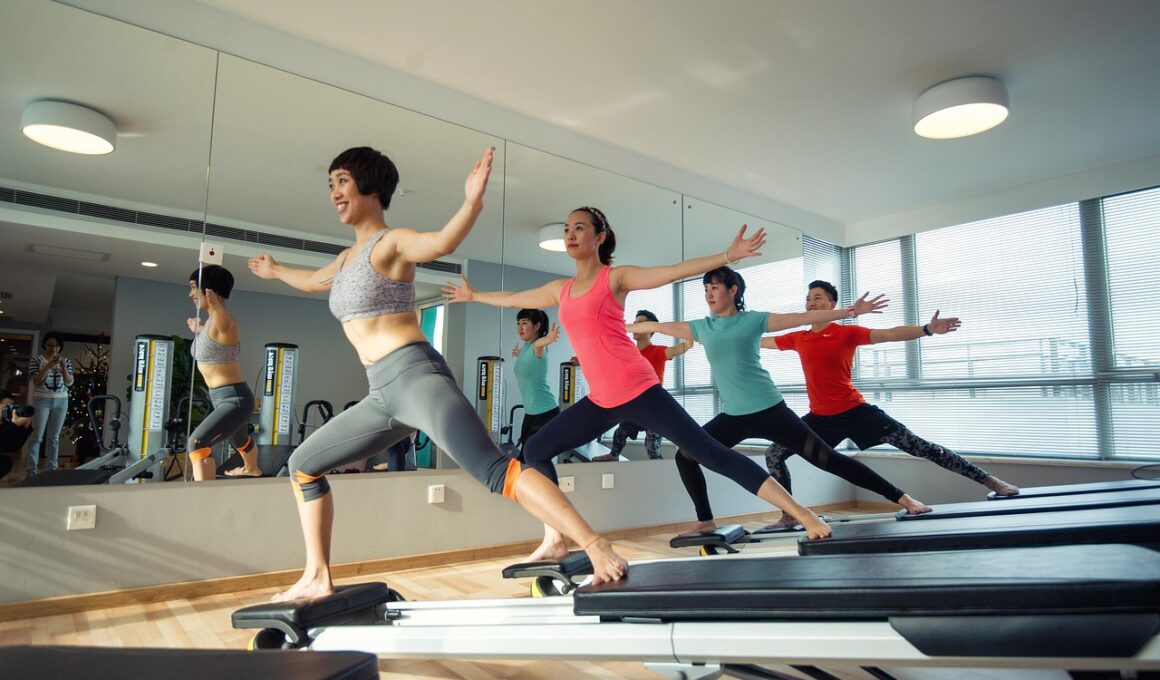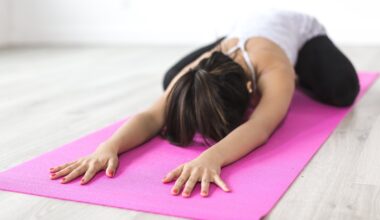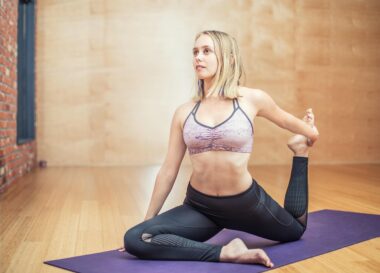Pilates as a Stress Relief Strategy for Anxiety Sufferers
Pilates is an effective exercise method that combines physical strength with mental awareness, particularly beneficial for individuals who experience anxiety and depression. This holistic approach focuses on controlled movements, breathing patterns, and mindfulness, which can alleviate stress. By engaging in Pilates, individuals can navigate their emotions while focusing on body alignment and flexibility. Understanding these elements enhances one’s mental, emotional, and physical well-being. As a low-impact exercise, Pilates is suitable for various fitness levels, making it accessible for many. Beginners to advanced practitioners can experience its calming effects. Research indicates that consistent Pilates practice not only increases physical productivity but can also significantly reduce symptoms of anxiety and depression. Integrating this form of exercise into a daily routine can foster resilience against stressors. Moreover, Pilates promotes relaxation techniques that help regulate breathing and cultivate a sense of peace. Engaging with these practices allows individuals to reconnect with their bodies, yielding significant psychological benefits. Traditional Pilates exercises can be modified to meet individual needs, making a customized approach effective in providing personal and emotional support to those affected by anxiety.
The mental health benefits of Pilates extend beyond mere physical exertion. Physiologically, Pilates engages core muscles and encourages proper posture, effectively releasing tension in the body. When we carry stress, it often manifests physically, leading to discomfort or pain. Through gentle stretching and controlled movement, Pilates helps alleviate these physical symptoms. Additionally, breathing techniques used during Pilates sessions can diminish anxiety levels. Focusing on breath control not only stabilizes physical movement but serves as a meditative practice, grounding individuals in the present moment. By practicing mindfulness, participants can learn to observe their thoughts and feelings without judgment. Alongside, Pilates combats feelings of isolation commonly associated with anxiety by fostering a sense of community. Many classes and workshops encourage interaction, creating a supportive network among participants. Establishing connections with others can significantly enhance motivation and accountability in maintaining a regular practice. Emphasizing both personal progress and group encouragement can lead to numerous breakthroughs for those feeling overwhelmed. Choosing to practice in a group setting also reinforces the idea that individuals are not alone in their struggles with anxiety and depression and builds resilience through shared experiences.
The Role of Mindfulness in Pilates
Mindfulness is a fundamental aspect of Pilates that plays a crucial role in stress reduction. Unlike other workout regimes that may focus solely on physical progression, Pilates encourages awareness of both thoughts and body sensations. This focus helps practitioners tune into their bodies, acknowledging feelings of tension or anxiety as they arise. During sessions, individuals learn to move deliberately and mindfully, allowing them to recognize their body’s responses to different stimuli. The practice encourages participants to maintain presence throughout each exercise, which can create a sense of calmness. Studies suggest that engaging in mindfulness practices, such as those found within Pilates, can diminish psychological suffering and promote emotional resilience. Moreover, practitioners often report experiencing enhanced self-awareness, leading to personal growth and stronger coping mechanisms. Consistent participation in mindful exercise fosters improved emotional regulation, enabling individuals to successfully navigate daily stressors. Consequently, fostering a deeper connection to oneself through Pilates can lead to long-term improvements in mental health. Mindfulness not only enhances the Pilates experience but serves as a practical tool to cope with anxiety and depression, with techniques that can be practiced outside of class.
In addition to physical and mental benefits, Pilates offers a natural pathway to self-compassion and positive body image. Individuals suffering from anxiety may develop negative self-perceptions, thus inhibiting their engagement in physical activity. However, focusing on Pilates helps mitigate these feelings, inviting practitioners to appreciate their bodies’ capabilities. As they develop strength and flexibility, individuals often experience increased self-confidence, reinforcing a positive mindset. Further, Pilates embodies principles of acceptance and patience—qualities vital for emotional growth. Through its structured method, practitioners learn to appreciate their progress, no matter how small. This enhances the belief that every step toward well-being is valuable and worthy of celebration. Such a positive perspective is crucial for those who tend to dwell on perceived failures or inadequacies. Furthermore, as practitioners become more engaged with their bodies, they often cultivate an attitude of kindness towards themselves. This shift in mindset can ripple through other areas of their lives, fostering improved relationships and overall well-being. In this way, Pilates can serve as more than an exercise—it can usher in transformative change, providing the emotional support necessary in combating anxiety and depression.
Structuring a Pilates Routine for Mental Clarity
Structuring a Pilates routine tailored for anxiety relief involves choosing exercises that emphasize breath work and mindful movements. Beginners may find it beneficial to start with simple exercises, such as the Cat-Cow stretch or the Child’s pose, which promote relaxation while easing body tension. These basic movements encourage gentle stretches that can be easily adjusted according to each individual’s comfort level. Gradually, practitioners can incorporate more challenging workouts that fulfill their evolving needs and goals. Consistency is key; maintaining a regular practice enhances not only physical fitness but also emotional resilience. Incorporating sessions two to three times weekly offers enough opportunity for growth. Additionally, practitioners can allocate time post-session for relaxation, which can help reinforce learning and mental clarity. Using that time for focused breathing or visualization further cultivates a calming environment. Creating a dedicated space for this practice is also essential. By establishing a peaceful workout area—away from distractions—individuals can deepen their focus and commitment. Ultimately, having a customized routine presents a structured framework for addressing anxiety, promoting calm while improving overall health and well-being.
As the understanding of mental health continues to evolve, so do the approaches to promoting emotional wellness. Pilates, with its unique combination of movement, breath, and mindfulness, has gained significant recognition as an effective practice for anxiety management. Being an adaptable exercise, Pilates appeals to a variety of individuals, including those seeking less intimidating methods of physical activity. Group classes also create an inclusive environment, drawing participants of different backgrounds who share similar challenges. This camaraderie fosters a nurturing atmosphere conducive to open discussion about mental health. Engaging in conversation can help demystify anxiety and lessen the stigma surrounding mental disorders. Moreover, instructors often cultivate supportive class environments to encourage questions, reinforcing the understanding that seeking help is vital. Workshops and community events can also provide valuable resources for those navigating mental health struggles. Taking advantage of these opportunities enhances knowledge and cultivates resilience. Furthermore, Pilates emphasizes the importance of self-care, allowing individuals to prioritize their mental health actively. With a growing community dedicated to wellness, practitioners will find that embarking on this path can inspire hope and healing against the challenges of anxiety and depression.
Conclusion: Embracing Pilates for Better Mental Health
Overall, embracing Pilates as a stress relief strategy serves as a powerful tool for those experiencing anxiety and depression. Its inherent focus on mindfulness, breathing, and body awareness equips individuals with essential skills for achieving emotional balance. The alignment of physical and mental exercises fosters a comprehensive approach to emotional stability, making it a desirable practice. Furthermore, the self-compassion developed through Pilates enables participants to cultivate a more uplifting internal dialogue, essential for combating negative thoughts. Integrating Pilates into one’s lifestyle offers numerous lasting benefits, encouraging sustainable wellness habits. As individuals develop a personal connection to their practice, they become empowered to manage their mental health actively. Ultimately, the success of this journey towards better mental health will depend on personalized routines that reflect unique needs and goals. Committing to consistent practice and embracing community support can significantly enhance outcomes. Lastly, understanding that progress may differ from person to person fosters a healthy view of growth. By choosing to participate in Pilates, individuals find not only physical rewards but a transformative journey toward emotional resilience—a pathway toward living a more fulfilling life free from heavy burdens of anxiety.
Integrating Pilates as a sustainable habit fosters a continuous cycle of mental health improvement. The journey involves both physical strength and emotional healing, enhancing overall life quality.





